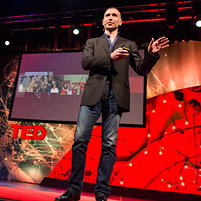Nowhere to Hide

Alessandro Acquisti
Alessandro Acquisti conducts research on how technology impacts privacy.
An associate professor of information technology and public policy at Carnegie Mellon University's Heinz College, Acquisti recently showed, using a smartphone, how easy it is to identify faces in the crowd — and, in some cases, get their social security numbers.
"Often we are not even aware of how much data we are actually revealing," he told CBS' Lesley Stahl in a segment that was featured on "60 Minutes."
Acquisti says nowadays, and mostly due to the success of social media and online social networks, most of us have fully identified, high-definition frontal photos of ourselves online.
"That wasn't the case ten years ago," he said.
And when you combine these identified images with technologies such as cloud computing, ubiquitous computing, and data mining or statistical re-identification techniques, Acquisti says you have the ability to identify and infer sensitive information about people in real time — starting merely from their faces online and offline.
Consider these potential scenarios:
- Your phone identifies the person at the party whose name you always forget. Or it tells a stalker in the bar your home address;
- The hotel where you booked a room recognizes and greets you as you enter the lobby because you friended them on a social network. Or because, with or without your consent, the hotel enrolled in some identity recognition service sold by a social network;
- A salesperson infers your credit score the moment you enter the dealership, and uses a psychological profile calculated in real time from your online posts to nudge you to accept a steep price for the car you want;
- An investigative agency finds missing or exploited children in databases of online photos;
- An administration is able to identify from remote, high-definition cameras, all of the thousands of participants in a peaceful protest.
"In short," Acquisti said, "face recognition could make our lives easier, or more comfortable, or more secure. Conversely, it could limit our freedom, endanger our security, ease the extraction of consumer surplus, and chill free speech by creating a state of constant and ubiquitous surveillance."
Perhaps the most fascinating aspect of Acquisti's privacy work is exploring the contradictions between people's attitudes and behaviors.
"In surveys, people claim they care about their privacy, but experimental evidence proves that most of us are easily convinced to reveal very personal information to strangers, and that we prefer not to incur the monetary or cognitive costs of adopting protective technologies," said Acquisti.
"Our studies suggest that the dichotomy does not imply that people simply 'do not care' about privacy. It's more complicated than that, actually," he explained. "People care. But the framing of the problem, or the personal belief that privacy is a right nobody should be asked to pay for, may in part explain the observed dichotomy."
Acquisti discussed the battle for privacy in a talk he gave at TEDglobal earlier this summer.
"One of the defining fights of our time will be the fight for control over personal information," Acquisti said, "and we need to be wary of being manipulated. The game is on, in other words, whether we like it or not."
Photo: James Duncan Davidson
Related Links: Heinz College | TEDglobal 2013: The Battle Between Public & Private | Acquisti at TEDx Mid-Atlantic [video] | 60 Minutes Preview: A Face in the Crowd [video]
